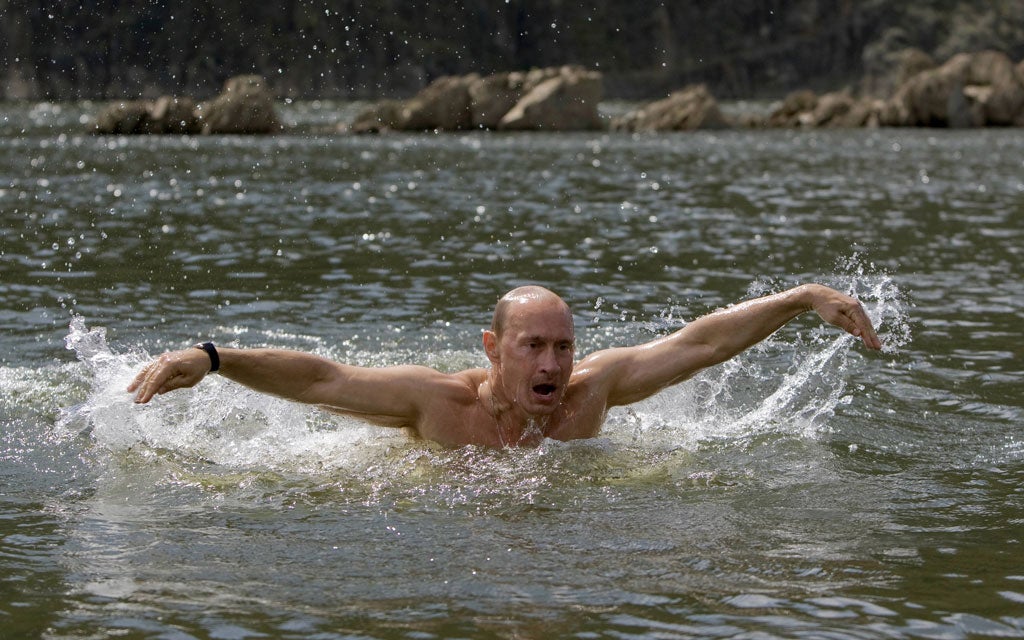The Strongman: Vladimir Putin and the Struggle for Russia, By Angus Roxburgh

Your support helps us to tell the story
From reproductive rights to climate change to Big Tech, The Independent is on the ground when the story is developing. Whether it's investigating the financials of Elon Musk's pro-Trump PAC or producing our latest documentary, 'The A Word', which shines a light on the American women fighting for reproductive rights, we know how important it is to parse out the facts from the messaging.
At such a critical moment in US history, we need reporters on the ground. Your donation allows us to keep sending journalists to speak to both sides of the story.
The Independent is trusted by Americans across the entire political spectrum. And unlike many other quality news outlets, we choose not to lock Americans out of our reporting and analysis with paywalls. We believe quality journalism should be available to everyone, paid for by those who can afford it.
Your support makes all the difference.Most readers of The Strongman will start out with an opinion of Vladimir Putin. For a majority of Britons and Americans that opinion will probably be negative. The cover of Angus Roxburgh's book panders to that prejudice. Putin is depicted stern and in shades, every inch the Soviet KGB man. That highly critical image is reinforced by Roxburgh's introduction. We are talking cold eyes, a "glowering, piercing, highly unsettling look", and the initials KGB sprinkled around.
There for the most part, however, the scolding stops and the substance begins. The cover and the opening are deceptive. You might regard them almost as a come-on: offer potential readers what they expect, then give them something more considered. The Strongman is less about any "strong man" in the Kremlin and more about someone called Putin, who found himself plucked out of obscurity and propelled into a "struggle for Russia".
Roxburgh has written quite a conventional history of Russia over the past 12 years, with admirable even-handedness and insight. But The Strongman is not only political history; it is informed by the author's close acquaintance with many of the prime players. Roxburgh is, rightly, upfront about the various roles he played – journalist, author and, perhaps surprisingly, PR man when the Kremlin decided that what it really needed was expensive image enhancement.
Roxburgh's frustration at the bull-headedness of the Kremlin bureaucracy comes across vividly. He cannot understand why they cannot understand that perception cannot be completely detached from the reality. If Putin and his people wanted to be seen more indulgently in the West, then it was not enough to call in even the best consultants in the business. They had to be prepared to listen and act on at least some of their advice.
The glimpses Roxburgh gives of his PR experiences should be presented to the next occupants of the Kremlin, who just might – given the fresh pressure for change from Russia's growing middle class – be more amenable to taking advice, or at least concerned about how their predecessors appeared to an informed observer who wished them well. They were so often their own worst enemies.
The subjective frustrations of Roxburgh's PR work, however, are a sideline. This is a serious book that portrays a Russian administration at sea in a world most of its officials did not comprehend. Putin himself emerges as a more complex character than the epithet "strongman" would suggest. Having met Putin more than half a dozen times, in the Valdai Club format that Roxburgh discusses (correction: we usually did not stay at five-star hotels!), I share many of his observations. Putin comes across as quick, clever, perceptive, stubborn, boorish and charming by turns, with a temper that can switch from calm to fierce passion in a fraction of a second.
Roxburgh is cautious – and I share that caution – when he mentions the wilder claims about Putin's personal profiteering from high office, and I detect that this is not just fear of lawyers. Putin does not strike me as particularly materialistic. And while I have heard him inveigh against Chechens who have committed acts of terrorism, I have also heard him speak – as Roxburgh clearly has not - with admiration and sympathy for the Chechens as a people and the suffering they endured under Stalin.
Every chapter of this book is worth reading, benefiting from interviews with a wide range of individuals, insider titbits, and the author's knowledge and empathy. But his early chapter on the intricacies of economic reform and the later chapter on the Georgia war are particularly clear and well-judged. The Strongman is a tie-in with a television series, Brook Lapping's Putin's Russia and the West, for which Roxburgh was chief consultant. The many interviews the team conducted inform the book and give it a liveliness and authenticity. But there is a downside: the proliferation of quotations sometimes irritates, belonging more to broadcasting than prose.
Key to the latter part is the relationship between Putin and the protégé he made President, Dmitry Medvedev. Roxburgh might have given more emphasis to the generational difference (16 crucial years) and the class difference between them. But when he asks why the ostensibly more liberal Medvedev was unable to deliver on many reformist pronouncements, he asks the question at the heart of this book. "Is it because Medvedev is simply a Putin puppet, dancing his liberal dance to entertain the West...? Or is it because a real reformer is thwarted at every turn by his master? Or is the task of reforming Russia simply too great, and the system... kills every initiative?" As Russia enters yet another period of change, Roxburgh is not the only one who will be hoping for an answer.
Join our commenting forum
Join thought-provoking conversations, follow other Independent readers and see their replies
Comments